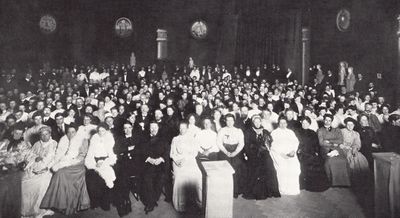Munich Congress 1907

The Congress of the Federation of European Sections of the Theosophical Society was held in Munich at Whitsun from 18 - 21 May 1907 in the Tonhalle (Kaim Rooms), Türkenstraße 5, and was intended to seek to promote the common work of the members of the Theosophical Society from different countries. After the decision had been taken at the Paris Congress in early June 1906 to hold the next Congress in Munich, Rudolf Steiner and Marie von Sievers, together with their Munich friends, began the careful planning of the meeting. One of the main concerns from the beginning was the artistic-esoteric design of the conference. Above all, however, Steiner wanted to anchor the Christian Rosicrucian esotericism he had represented from the beginning in the international Theosophical Society. However, this was rejected by most non-German theosophists, who were much more inclined towards the Eastern path of spiritual education. Rudolf Steiner writes about this in "The Story of My Life":
„The nature of the Munich activity led to the Theosophical Congress, which was to be organised by the German Section of the Theosophical Society in 1907, being held in Munich. These congresses, previously held in London, Amsterdam, Paris, contained events dealing with Theosophical problems in lectures or discussions. They were modelled on the learned congresses. The administrative questions of the Theosophical Society were also dealt with.
In Munich, many things were modified. We - the organisers - had the large concert hall, which was to be used for the congress, decorated inside so that its form and colour would artistically reflect the mood that prevailed in the content of the oral proceedings. The artistic environment and the spiritual activity in the room were to be a harmonious unity. I attached the greatest importance to avoiding abstract, unartistic symbolism and letting the artistic feeling speak.
An artistic performance was inserted into the programme of the congress. Marie von Sivers had translated Schure's reconstruction of the Eleusinian drama long ago. I adapted it linguistically for a performance. We added this drama to the programme. A link to the old mystery system, however weak, was thus given - but, what was the main thing, the congress had artistic elements in it. Artistic, which pointed to the will not to leave the spiritual life without the artistic in society from now on. Marie von Sivers, who had taken on the role of Demeter, already clearly indicated in her presentation the nuances that the dramatic was to acquire in society. - Moreover, we were at a time when the declamatory and recitative art had arrived, through Marie von Sivers, at the decisive point in the working out of the inner power of the word, from which it was possible to proceed fruitfully in this field.
A large number of the old members of the Theosophical Society from England, France, and especially Holland, were inwardly dissatisfied with the innovations brought to them by the Munich Congress. - What would have been good to understand, but which was considered by very few at the time, was that with the anthroposophical current something of a quite different inner attitude was given than that of the previous Theosophical Society. In this inner attitude lay the real reason why the Anthroposophical Society could not continue to exist as a part of the Theosophical Society. Most, however, laid the main stress on the absurdities which had developed in the course of time in the Theosophical Society and which had led to endless quarrels.“ (Lit.:GA 28, p. 464f)
Literature
- Karl Lierl, Florian Roder: Anthroposophie wird Kunst; Der Münchner Kongress 1907 und die Gegenwart; [1] ISBN 978-3-00-025311-9
- Rudolf Steiner: Mein Lebensgang, GA 28 (2000), ISBN 3-7274-0280-6 English: rsarchive.org German: pdf pdf(2) html mobi epub archive.org
 |
References to the work of Rudolf Steiner follow Rudolf Steiner's Collected Works (CW or GA), Rudolf Steiner Verlag, Dornach/Switzerland, unless otherwise stated.
Email: verlag@steinerverlag.com URL: www.steinerverlag.com. Index to the Complete Works of Rudolf Steiner - Aelzina Books A complete list by Volume Number and a full list of known English translations you may also find at Rudolf Steiner's Collected Works Rudolf Steiner Archive - The largest online collection of Rudolf Steiner's books, lectures and articles in English. Rudolf Steiner Audio - Recorded and Read by Dale Brunsvold steinerbooks.org - Anthroposophic Press Inc. (USA) Rudolf Steiner Handbook - Christian Karl's proven standard work for orientation in Rudolf Steiner's Collected Works for free download as PDF. |
